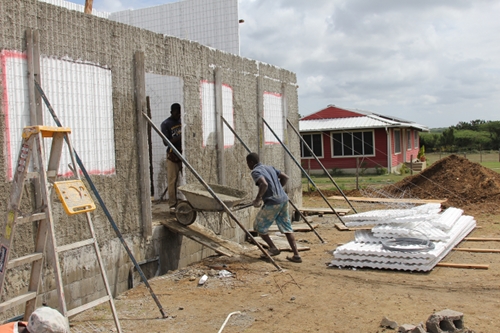November 11th, 2013 — 6:00am
Sometimes when I want to help someone I try hard to offer an insightful solution to the problem they are facing.
I’m learning I make a bigger difference when I do these three things instead:
Show Up: Just be there. Be physically and emotionally present.
Relax: Fear is contagious. So is relaxed confidence.
Listen: Openly, patiently, listen.
These are simple, they are not easy, and sometimes, they are all it takes.
November 4th, 2013 — 1:52pm
I spent time over the last year intentionally learning about poverty alleviation and some nonprofits that work in that area. In March, 2013 I spent time with Paulos Group, a growing organization that does housing and community development in Haiti. After visiting some other organizations, I came back to Paulos Group to get more involved. I love their entrepreneurial spirit, progressive, best-practices thinking about poverty alleviation, and efficient ability to generate results in very lean ways.
I’m convinced that Paulos Group has the opportunity to make a remarkable impact on poverty in their area, and even on how community development is done in the poorest places on earth.
The leadership of Paulos Group recently invited me to join their board of directors, an opportunity I am thrilled to engage in. I am so grateful for the opportunity to be part of this work.
In a few weeks my wife and I, and our kids are heading back to Haiti for another visit. It promises to be an adventure.

Haitian employees of Paulos Group hard at work building a house.

The same house, with it's proud occupants on move-in day.
August 5th, 2013 — 8:54am
I recently attended an excellent presentation about strategy by Professor James Schrager of the University of Chicago Booth School of Business.
Something he said near the beginning has stuck with me. He said when they study great strategists, people who have a history of making really good decisions, they find that they all take time to think about strategy. That the question “Do you think about a strategy?” is a more important one than “How do you think about strategy?”.
When you spend time thinking about where you want to go, and how you intend to get there, you discover opportunities to powerfully influence the outcome.
July 12th, 2013 — 7:19am
Often I’m asked (or ask myself) “What should we do?” and realize I need to back up and ask another question. “What problem are we trying to solve?” I’ve found this seemingly-obvious question to be surprisingly powerful.
Sometimes there isn’t a problem, and we’re just trying to fill space. Sometimes the problem we are implicitly trying to solve isn’t one that actually aligns with our goals. Sometimes we haven’t understood the problem enough to allow our brains to tackle it in a meaningful way.
Gathering relevant data and organized thoughts for a clear and specific formulation of the problem is more than half the battle.
July 2nd, 2013 — 12:23pm
Loss Aversion is one of a few persistent biases our human brains have. Sometimes it leads us to make bad leadership and business decisions.
We don’t like to let go of projects or people we have invested in. We don’t like to admit we were wrong, we failed. Chalking something up as a loss is painful, and we tend to hang on too long in an attempt to avoid that pain.
Skilled leaders promptly confront situations that have “not working out” written all over them.


